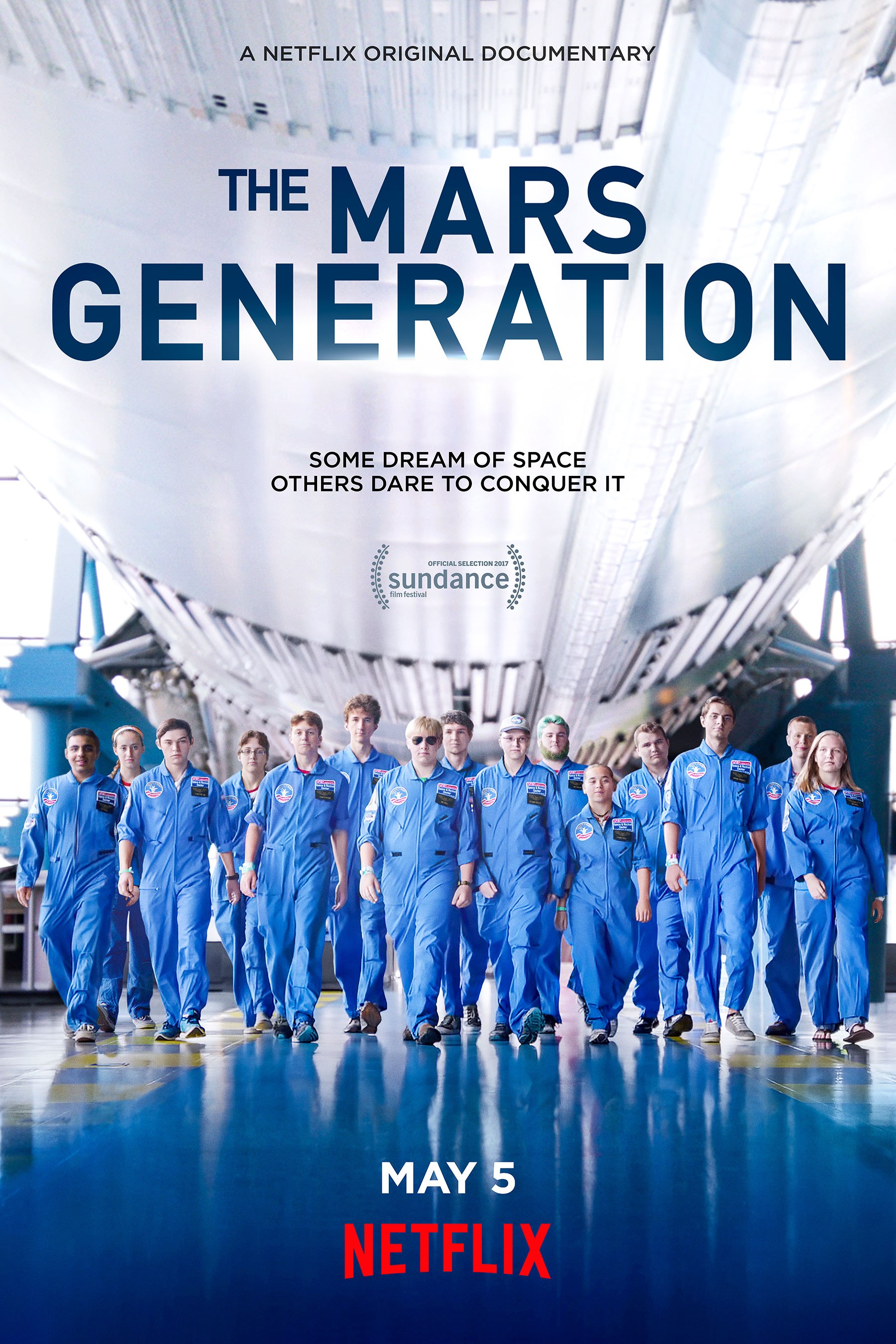Meet 'The Mars Generation': In Documentary, It's Red Planet or Bust
Breaking space news, the latest updates on rocket launches, skywatching events and more!
You are now subscribed
Your newsletter sign-up was successful
Want to add more newsletters?

Delivered daily
Daily Newsletter
Breaking space news, the latest updates on rocket launches, skywatching events and more!

Once a month
Watch This Space
Sign up to our monthly entertainment newsletter to keep up with all our coverage of the latest sci-fi and space movies, tv shows, games and books.

Once a week
Night Sky This Week
Discover this week's must-see night sky events, moon phases, and stunning astrophotos. Sign up for our skywatching newsletter and explore the universe with us!

Twice a month
Strange New Words
Space.com's Sci-Fi Reader's Club. Read a sci-fi short story every month and join a virtual community of fellow science fiction fans!
A new featurette for the Netflix original documentary "The Mars Generation" — which explores the potential for today's teenagers to go to Mars in 20 years if humanity plays its cards right — highlights the legacy of Apollo in setting up aspirations for Mars.
Clips from a famous John F. Kennedy speech in 1962 play over video of astronauts walking on the moon. "Many years ago, the great British explorer George Mallory, who was to die on Mount Everest, was asked why did he want to climb it. He said, 'Because it is there,'" Kennedy said in the speech.
"Well, space is there, and we're going to climb it, and the moon and the planets are there, and new hopes for knowledge and peace are there." [Photos: Visions of Future Space Habitats & Artificial Ecosystems]
Interspersed with that speech, former NASA astronaut Don Thomas and science communicator Neil deGrasse Tyson describe the trajectory of America's space program. You can watch the clip online here.
"I've always been a closet space nerd, and I thought I knew a lot about space," the film's director, Michael Barnett, told Space.com. He is an Emmy-award winning filmmaker who has covered topics ranging from superheroes to American writer and intellectual Gore Vidal.
Barnett's initial plan was to do a 3- to 5-minute web series about Space Camp in Huntsville, Alabama, but upon visiting and interacting with the class of teenagers, he realized there was more to say about the future of space exploration, he said.
"What I thought I knew about space was annihilated by their knowledge," Barnett said, adding that watching the campers interact with the experiments and discuss space history was inspiring. "They interpreted it and processed it differently, and they were unified in their frustrations of NASA and the bureaucracy of what's held us up in exploration."
Breaking space news, the latest updates on rocket launches, skywatching events and more!
Criticizing NASA's path
Barnett said he tried to be as ambitious as possible in the 1-hour, 40-minute documentary, which begins and ends with Space Camp, but also interweaves a brief history of space exploration — focusing on items the general public may not know, he said.
For example, when talking about the early days of the space race between the United States and the Soviet Union, Barnett highlights that a pioneer of the U.S. rocketry program — Wernher von Braun — was a Nazi brought to the United States after the Second World War.
Once he arrived, Von Braun became an advocate for American spaceflight, talking about the future of space on the Disney Channel while designing several rockets for NASA, including the Saturn V rocket that brought astronauts to the moon in the 1960s and 1970s. [NASA's Mighty Saturn V Moon Rocket Explained (Infographic)]
Apollo reached a high-water mark in 1969 when it landed the first astronauts on the moon, but, as the film shows, President Richard Nixon quickly shut down the program, because the U.S. public was more concerned about issues on Earth. (Clips from the documentary show scenes from the Vietnam War and riots, which are frequently cited by space historians as some of the pressing issues detracting attention from the space program.)
"We had the staff in place and Saturn V could have got[ten] us there [to Mars]," Barnett said. "Then Nixon came in and decided he wanted to shut it down. He wanted to stop JFK's [President John F. Kennedy's] legacy and go in a different direction."
After that, the documentary heavily criticizes the space shuttle program. Time magazine editor-at-large Jeffrey Kluger, co-author of the book "Apollo 13" (Mariner Books, 2006), is among the people in the documentary who say the shuttle program brought people into space merely to repeatedly circle the Earth, rather than pushing spaceflight forward.
Space advocate and Planetary Society CEO Bill Nye points out that the shuttle program was completed in 2011, with no other rocket designed to immediately succeed the shuttle. While the documentary does mention that SpaceX and Boeing have plans to launch humans into space from American soil, the film focuses on the fact that the Russians are the only ticket into space for NASA right now.
"We don't have a ship that takes humans to space right now," Barnett told Space.com, adding that working with the Russians can be a "geopolitical nightmare." He added, "Ninety percent of the public thinks that NASA is closed. So it's a good film for this time to show that NASA is more important than ever."
Mars aspirations
The documentary also weaves in extensive discussion about going to Mars, saying that Von Braun envisioned it happening in the early 1980s. While that timeline may sound absurd today, experts say that in the context of the quickly moving Apollo program, a 1981 deadline seemed reasonable in 1969, when the moon program had brought humans to the lunar surface in less than a decade. [How Living on Mars Could Challenge Colonists (Infographic)]
The film makes little mention of ongoing work at the International Space Station to study the effects of space on the human body, which NASA says is one crucial step needed before undertaking a mission to Mars. The film similarly fails to mention other research into Mars habitats. But the documentary does show one of the technological pieces for Mars missions coming together: Blue Origin's and SpaceX's self-landing rockets, which the documentary portrays as crucial steps in lowering the cost of space exploration.
Meanwhile, footage from Space Camp shows the students working through several problems associated with space exploration, including launching and landing rockets, constructing heat shields and making robots to explore the Martian surface. The students in the film say they feel they could be the Mars generation, the first to explore the Red Planet in person, but add that they're concerned NASA's pace is too slow for them to get to Mars by the 2030s.
"Mars is in the collective consciousness right now," Barnett said, but added that the program has several obstacles to overcome first, including putting together the technology and developing the political will.
The Mars Generation is available now on Netflix in both the United States and Canada. (For other countries that carry Netflix, please verify on your local network.)
Follow Elizabeth Howell @howellspace, or Space.com @Spacedotcom. We're also on Facebook and Google+. Original article on Space.com.

Elizabeth Howell (she/her), Ph.D., was a staff writer in the spaceflight channel between 2022 and 2024 specializing in Canadian space news. She was contributing writer for Space.com for 10 years from 2012 to 2024. Elizabeth's reporting includes multiple exclusives with the White House, leading world coverage about a lost-and-found space tomato on the International Space Station, witnessing five human spaceflight launches on two continents, flying parabolic, working inside a spacesuit, and participating in a simulated Mars mission. Her latest book, "Why Am I Taller?" (ECW Press, 2022) is co-written with astronaut Dave Williams.

